This post was updated April 30 at 8:23 p.m.
UC Berkeley as an educational institution has long been synonymous with student activism and civic engagement, its campus serving as the backdrop to catalytic movements ranging from the Free Speech Movement to the Disability Rights Movement.
Its reputation – often subject to controversy – is not in vain. Candidly, I can say that it would be a rare occurrence to walk to lecture – or even the break between lectures – without coming across a highly-sophisticated student-organized protest, well-equipped with signs, banners, flyers and megaphones.
This year alone, I have seen students protest various campus decisions like the clearing of People’s Park, a community space home to student and counterculture protests in the 1960s. This comes along with a multitude of national and global issues, such as the recent efforts from pro-Palestinian student activists, who set up an encampment in support of a UC divestment from Israeli companies on Sproul Plaza, a main center of student activity.
Consequently, it would not be unreasonable to infer that Berkeley is not just the “politically-engaged” UC or a straggling participant in the varying levels of activism we see on university campuses across the state. Routinely, it sparks the fire that trickles down to other institutions on a wide range of social movements and political action.
As someone heavily involved in political advocacy, how could I resist this allure?
I am a first-generation Armenian American. Additionally, I am a Los Angeles native, home to the largest diaspora of Armenians outside of the homeland itself. I grew up taking part in Armenian protests and events. Protesting is in my blood, with humble beginnings of attending rallies in a stroller to standing on stage giving a speech to a sea of red, blue and orange facing the Consulate General of Turkey in Beverly Hills.
Unquestionably, the university’s preeminence in this area pulled me to it when I was applying as a transfer student.
However, the humanitarian crisis and blockade quickly morphed into a shrouded genocide, forced displacement of over 100,000 ethnic Armenians, and harrowing attempts to “reintegrate” Armenians into Azerbaijan. Our “activist” campus has remained conspicuously silent – especially in contrast to the engagement seen at UCLA, most notably on an institutional level, albeit still inadequate.
The current situation is dire.
Beginning in September 2020, Artsakh, also known as Nagorno-Karabakh, experienced brutal conflicts because of renewed aggression from Azerbaijan, leading to numerous human rights violations and civilian casualties. Azerbaijan began blockading the 95% Armenian population of Artsakh in December 2022, launched a large-scale military offensive in September 2023, and the “Republic of Artsakh” as we know it was officially dissolved Jan. 1.
Words cannot even come close to explain how devastating this was.
UC Berkeley’s response? Nothing.
UCLA, on the other hand, alongside recognizing the Israeli-Palestinian war in a campuswide message Oct. 9, did reference what was happening in Artsakh.
UCLA Chancellor Gene Block said, “I also wish to recognize that this latest news adds to other deeply concerning recent international events, including violence taking place against civilians in Artsakh.”
He added, in a post on X, formerly known as Twitter, post, “Like many in our Bruin family and around the world, I am deeply concerned by violence against civilians in Artsakh (Nagorno-Karabakh). UCLA denounces violence in all forms and we hope for a peaceful resolution that respects the dignity and rights of all in the region.”
Drafted by the campus Armenian Students Association and sponsored by UCLA Undergraduate Students Association Council president Naomi Hammonds, UCLA’s USAC also unanimously passed a resolution “condemning the genocide of the ethnic Armenian population of Artsakh and calling for the UC’s immediate divestment from the Republic of Azerbaijan and the Republic of Turkey.”
UC Berkeley has not done much in the interim. Notably, there have been no university-led efforts, no organized protests and – perhaps most distressing of all – no official statement from the Chancellor or any member of the administration denouncing Azeri aggression.
This inaction is beyond disappointing for an institution that touts around the political movements it has sowed the seeds of like a marketing ploy but does not speak up when it matters, subsequently going against everything this university stands for.
Our failure to act in the face of injustice compromises our principles and place in history, suggesting a selective mentality toward human rights.
Here’s how we can make a difference:
- Communication: An official statement denouncing the brutality, genocide and ethnic cleansing committed against Armenians in Artsakh must be issued by UC Berkeley. Adopting an official position would align us with UCLA in resisting injustices while reaffirming our steadfast commitment to safeguarding human rights.
- Education: In order to inform our community, we must utilize our academic resources. Organizing lectures and panels with campus experts could provide insight into the intricacies of the conflict and examine its political, ethical and historical implications.
- Unity: Ultimately, we are able to demonstrate a UC-wide unity by partnering with UCLA and other UC campuses. This coordinated effort could represent an outstanding testament of the UC system’s influence and collective strength.
The time has come for UC Berkeley to support Artsakh and Armenia, aligning our actions with our reputation as an epicenter for student advocacy and agitation. In addition to standing behind our peers at UCLA, let’s take back the initiative in the struggle for justice, guaranteeing that Berkeley not only tackles this crisis head on but also leads the movement as it used to.
Melody Seraydarian is a journalist and rising fourth-year media studies student at University of California, Berkeley.
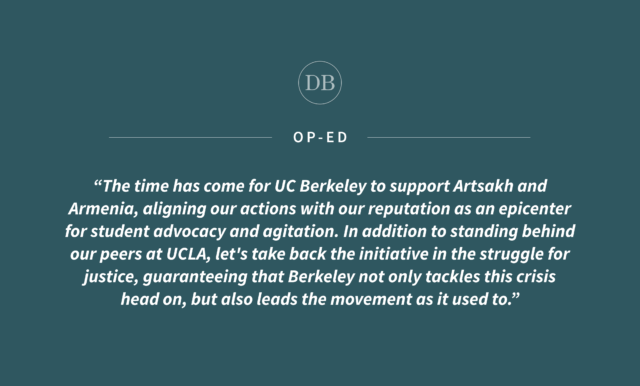

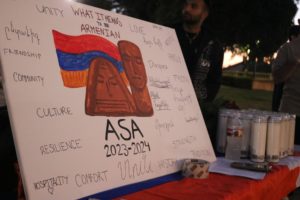
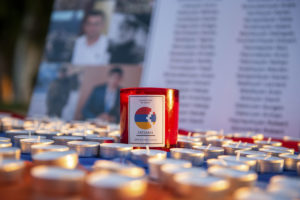
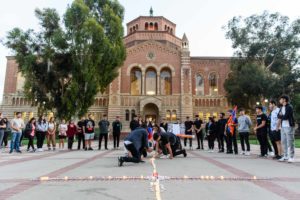
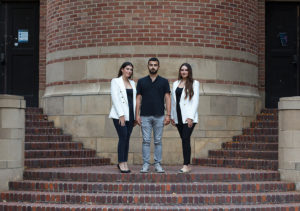
Comments are closed.